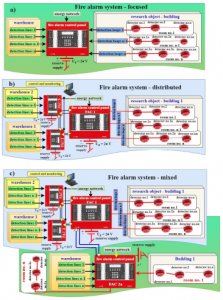Repair Fire Alarm System Testing, Inspection and Maintenance

Fire alarm systems are expected to help protect people, property, and assets. But you can’t tell if they’re fully operational just by looking at them. As with any other system, electronics and other components can degrade over time and compromise the system’s operation. Dust, dirt, and other contaminants can cause problems with smoke detectors. Such things as vandalism, remodelling, and improper maintenance procedures can also damage fire protection equipment. The good news is that with proper testing, inspection, and maintenance you can keep your fire alarm system at best operating performance. In addition to ensuring protection, keeping your system in good condition reduces expenses by preventing unbudgeted emergency repairs and costly false alarms.
Where to start. Knowing the system’s age and maintenance history helps you decide the steps you must take to keep its operational readiness. Systems under five years old should require little effort to keep. In systems so young, problems are usually due to marginal installation like improper grounding or environmental factors like voltage transients. Periodic system testing and inspection by qualified specialists can detect many such problems.
Systems between five and ten years old may experience part breakdown caused by harsh, but normal, environmental factors. Voltage fluctuations, temperature, and humidity may cause system failure or nuisance alarm problems.
Systems between ten and fifteen years old can still supply proper life-safety response. However, systems in this category need close attention, even with proper maintenance procedures in place. If the system has had a history of poor maintenance or none at all, it’s likely that failure of components and improper monitoring of system components will occur.
Systems approaching 20 years of age may be beyond their technological life expectancy. The system may continue to work satisfactorily if properly kept, but you need testing and inspection by trained specialists to ensure proper system response will occur in an emergency.
The steps. The maintenance activities for fire alarm systems can be summed up in five steps.
- Test and calibrate alarm sensors, such as flame and smoke detectors, per manufacturer specifications. This requires knowing about the different sensors—and their testing requirements, failure modes, and re-installation requirements.
- Simulate inputs and evaluate the annunciators. This requires specific knowledge of the system under test.
- Set sensitivity. This requires an understanding of the particular system, the specific application, and fire detection theory.
- Coordinate with fire department to evaluate the input to their system.
- Check the battery for corrosion and end date, then take proper action, if necessary.
These steps seem simple enough, provided you have the knowledge. However, that knowledge is useless if you don’t pay absolute attention to detail. Experience shows that maintenance technicians under pressure to keep production equipment running often overlook important details because “nothing is broken.”
Standards and guidelines. Most system manufacturers recommend at least one full annual test and inspection after first installation and acceptance. Various agencies, organizations, and local authorities recommend, and in some cases, mandate, testing intervals.
In virtually all cases, the standards outline minimum requirements. The potential problem, however, is that not all fire alarm systems are subject to the same environmental and ambient conditions. Therefore, meeting smallest standards of all applicable codes and standards may not supply the best protection for a facility. Because of this, manufacturers’ service organizations may recommend inspections and maintenance that exceed published standards and guidelines.
System maintenance. In addition to system age, you must consider budget and staffing resources. Does your staff have the time and ability to properly keep this critical life-safety system? Will it be more cost-effective to have the manufacturer’s service organization or a contractor specializing in fire alarms perform the maintenance? The most stringent standards and guidelines are meaningless unless the people performing the inspection, testing, and maintenance are knowledgeable and qualified to service the fire alarm system.
Facility maintenance people usually don’t possess the experience and knowledge found in manufacturer’s service technicians, whose daily work revolves around fire alarm system technology in a variety of environments and circumstances. Some facilities have answered this problem by sending their people to factory-sponsored training courses. This approach works, if done on an ongoing basis.
You can get around the training dilemma by using a factory service agreement. These can range from a basic on-call agreement to regularly scheduled service visits. Emergency service offering four-hour and eight-hour response times, on a 24-hr-a-day basis, is a choice available in most service agreements. This service usually provides response within the specified time, along with repair and replacement of equipment. Rapid emergency response is almost universal for the healthcare and lodging industries because of around-the-clock occupancy by staff, patients, and guests.
The best-designed fire alarm system can be made ineffective, if improperly kept. When you’re pinched by budgets, it’s tempting to take the risk that a fire won’t happen and delay responsible decisions about your fire protection until the next quarter. However, courts have increasingly ruled against people who have made such decisions and held them—and their managers—personally and criminally liable. You must ensure your fire protection system runs properly, even if that means dipping into other budgets.
For more information on Safety Training do click this link to MASMA Safety or click here for more information. Do not hesitate to call us at 019-2000643. MASMA Fire Engineering – Your Trusted Fire Contractor.
